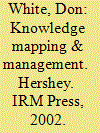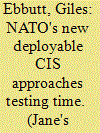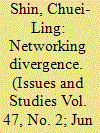| Srl | Item |
| 1 |
ID:
046234


|
|
|
|
|
| Publication |
Hershey, IRM Press, 2002.
|
| Description |
xii, 328p.Pbk
|
| Standard Number |
1931777179
|
|
|
|
|
|
|
|
|
|
|
|
Copies: C:1/I:0,R:0,Q:0
Circulation
| Accession# | Call# | Current Location | Status | Policy | Location |
| 046010 | 658.4038/WHI 046010 | Main | On Shelf | General | |
|
|
|
|
| 2 |
ID:
129789


|
|
|
| 3 |
ID:
107692


|
|
|
|
|
| Publication |
2011.
|
| Summary/Abstract |
This study challenges the prevailing assumption that a transnational advocacy network (TAN) is a unitary and single actor constituted of participants who share similar beliefs, and presents another aspect of the TAN. It asserts that, on the one hand, a TAN is a network of similarity as it links participants with shared ideas, and on the other hand, it is a network of divergence because of dissimilarities in the actors' characters, interests, or objectives. While the existing literature has examined the development of TANs of similarity, the following key questions remain: how does a TAN deal with the problem of its internal divergence? and conversely how does the diversity problem affect the development of a TAN? To explore the problem of networking with divergence, the study discusses the dimensions of divergence, the impact of divergence, and the management of divergence. It further examines two TAN cases: the "comfort women" TAN and the anti-Yasukuni TAN. It is found that divergence can add pluralism to a TAN if the members' diversity is dealt with positively, with actors complementing each other's roles, although divergence can lead to plurality stagnation when the TAN fails to accommodate divergence efficiently and is caught in conflicts because of the actors' differences. This study asks what affects the decision of a TAN to deal with the problem of divergence and suggests that it depends an whether the divergence involves the risk of unmanageable network cohesion and whether the TAN could afford to live with the network uncertainty that might result flit did not adapt to network divergence. The experiences of the two TAN cases are a valuable reference but they do not provide generalized answers to the question of dealing with divergence.
|
|
|
|
|
|
|
|
|
|
|
|
|
|
|
|